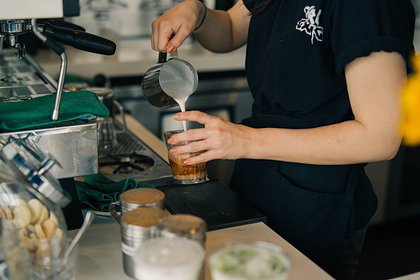Brewing Excellence: The Essential Guide to Barista Training

Becoming a barista is a lot more than just understanding how to make a good cup of coffee—it’s about mastering an art form that blends science, technique, and customer service. Whether you're enthusiastic about coffee or looking to start a career inside the vibrant café industry, latte art course can be your gateway to creating exceptional coffee experiences.

Why Barista Training Matters
Baristas would be the heart associated with a coffee shop, accountable for crafting beverages that keep customers ever coming back. Training makes sure that baristas comprehend the fundamentals of coffee, from bean selection and grinding to brewing methods and latte art. Proper training not simply improves drink quality but also enhances efficiency, safety, and client satisfaction.
What to Expect in Barista Training
Coffee Fundamentals
Training begins with understanding coffee's origins, varieties, as well as the roasting process. Knowing the difference between Arabica and Robusta beans or the impact of grind size on flavor is crucial for making informed decisions.
Equipment Mastery
A barista's tools—espresso machines, grinders, and milk frothers—are extensions of the craft. Training includes hands-on practice with one of these tools, teaching maintenance and troubleshooting for consistency.
Brewing Techniques
From pour-over and French press on the perfect espresso shot, baristas learn various brewing methods. The goal is always to extract maximum flavor and aroma while adhering to customer preferences.
Milk Science and Latte Art
Steaming milk for the right texture and temperature is an art. Barista training covers how you can create microfoam and pour latte art, adding visual appeal to beverages.
Customer Interaction Skills
Beyond making coffee, baristas must build relationships customers, manage orders, and handle feedback gracefully. Training often includes role-playing scenarios to boost interpersonal skills.
Sustainability and Waste Management
Many programs emphasize the need for sustainable practices, for example minimizing waste, recycling coffee grounds, and utilizing eco-friendly products.
Benefits of Professional Training
Career Advancement: Certification can open doors to prestigious coffee shops and competitions.
Networking Opportunities: Training often connects aspiring baristas with industry professionals.
Enhanced Confidence: Proper training equips baristas to take care of busy shifts and demanding customers without difficulty.
Choosing the Right Barista Training Program
When selecting a program, consider its reputation, curriculum, and accreditation. Renowned programs just like the Specialty Coffee Association (SCA) certifications are highly regarded in the industry.
Barista training is surely an investment in skill and passion. Whether you’re crafting the ideal cappuccino or owning a bustling café, it equips you with all the expertise to excel. So, if coffee can be your calling, embrace the journey—every cup you brew could become someone's favorite.
